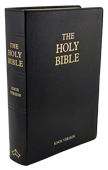The Holy Bible – Knox Translation
The Book of Exodus
|
Chapter 13
|
1
And this was another command the Lord gave to Moses:
2
Dedicate to me every first-born thing that Israel yields, whether it be man or beast, the first-fruits of every womb; all these are forfeit to me.
3
And now Moses said to the people, To-day you have left Egypt, your prison-house, and it is the Lord’s constraining power that has won you your freedom; mark out this day by eating no bread that has leaven in it,
4
this day of early spring which sees your departure.
5
When the Lord has given thee a home in the land of Chanaanite and Hethite, the Amorrhite, Hevite and Jebusite, that land, all milk and honey, which he promised thy fathers he would give thee, thou shalt keep alive, this month, the old custom.
6
For a whole week thou shalt eat unleavened bread, and the seventh day of it shall be kept as a feast in the Lord’s honour.
7
During those seven days you shall eat, all of you, bread without yeast in it; nothing leavened shall be seen anywhere within the frontiers of thy domain.
8
And thou shalt tell thy children in those after times all the Lord did for thee when thou madest thy escape from Egypt.
9
This custom is to endure like a mark branded on the hand, to be kept in view like a badge worn on the forehead; the law of the Lord shall be continually on thy lips; was it not the Lord’s constraining power that rescued thee from Egypt?
10
Thou shalt keep it alive, year after year, when the appointed time comes round.
11
And when the Lord has made good his promise to thee and to thy fathers, by bringing thee into the Chanaanite land and giving it to thee for thy own,
12
thou shalt dedicate to the Lord the first-born of every womb, the first-fruits of all thy cattle; every such thing, if it be of the male sex, is forfeit to him.
13
When an ass has its first foal, thou shalt offer a sheep in payment of its ransom; if not, it must be killed.✻ And every first-born man child of thy own race shall have a price paid for his ransom.
14
When, in after times, thy sons ask thee what is the meaning of this, thou shalt tell them how the Lord’s constraining power rescued you from your prison-house in Egypt;
15
how Pharao’s heart was hardened, and he would not let you go free, until the Lord slew every first-born male thing, man or beast, in the land of Egypt. That (thou shalt say) is why I immolate to the Lord every first-born thing, the first-fruits of every womb, except among my own children; and for these I must pay ransom;
16
this custom is to endure like a mark branded on the hand, to be kept in view like a badge worn on the forehead, to remind you, too, how the Lord’s constraining power rescued us from Egypt.
17
Thus the people had Pharao’s leave to go on their way; but God did not lead them by the nearest road, the road through Philistia. Here they would have found themselves met by armed resistance, and perhaps, in despair of their enterprise, returned to Egypt.
18
He took them round, instead, through the desert which borders on the Red Sea; and yet the Israelites left Egypt in war-like array.
19
Nor did Moses forget to take with him the body of Joseph, who had bound the sons of Israel by an oath to carry his bones away with them when God shewed mercy to them.
20
Their first encampment after leaving Socoth was at Etham, on the very frontier of the desert.
21
And the Lord went on before, to guide them on their journey; by day, in a pillar of cloud, by night, in a pillar of fire; he was their guide at all times;
22
every day a pillar of cloud, every night a pillar of fire moved on before the people.


